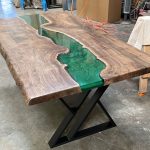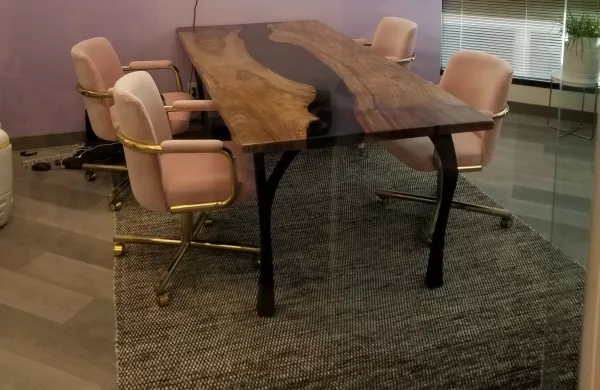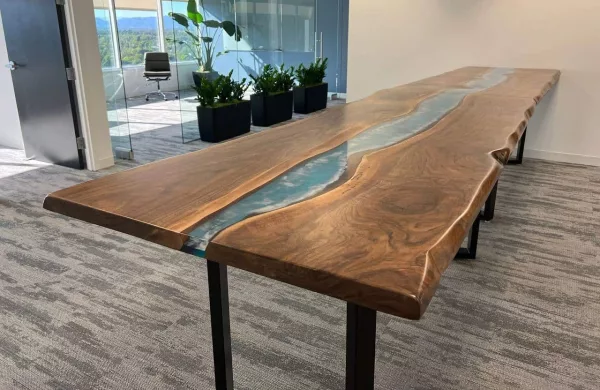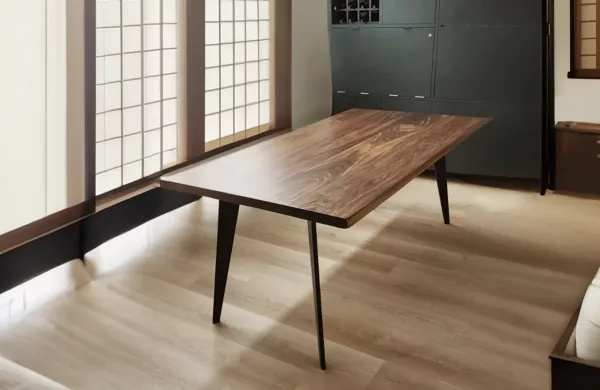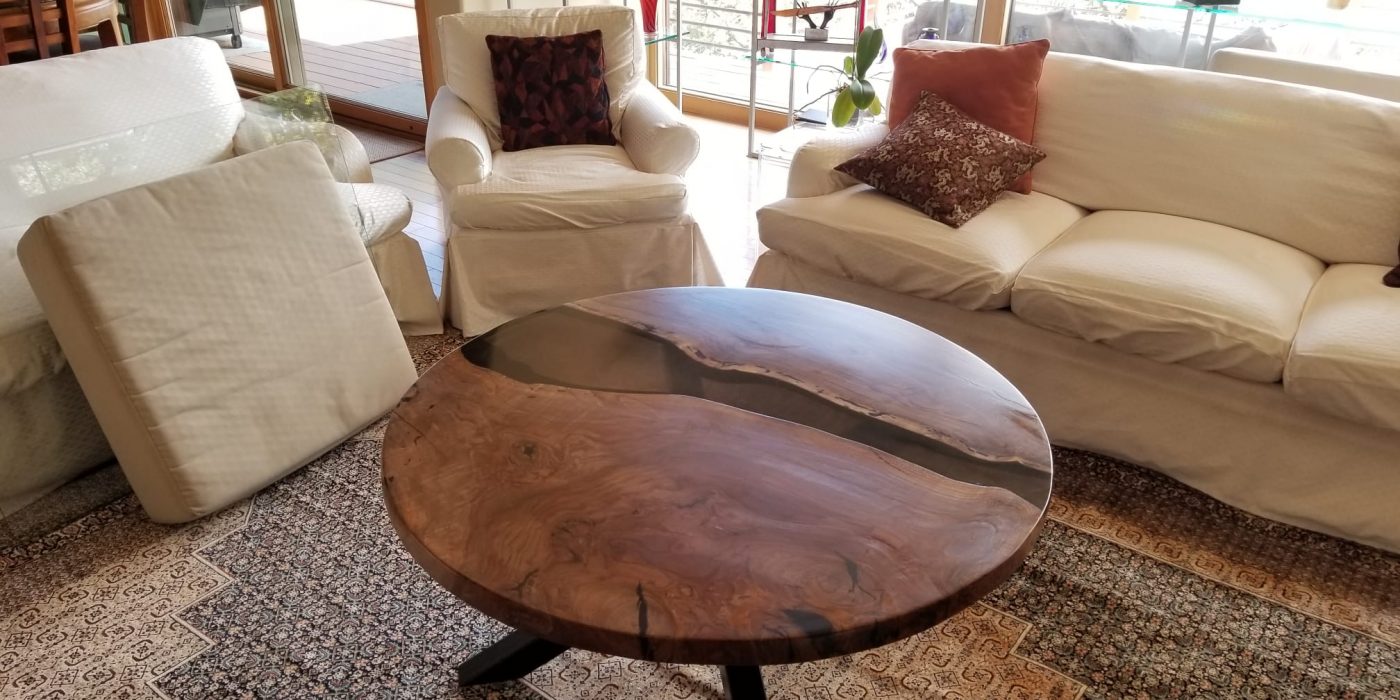
Walnut coffee tables offer a range of benefits that make them a popular choice for homeowners and interior designers alike.
Here are some of the key pros of walnut coffee tables:
- Aesthetic Appeal: Walnut wood has a rich, warm color that ranges from light brown to dark chocolate, with beautiful grain patterns that can add depth and texture to any room. Its natural luster can be enhanced with finishes that bring out its elegance and sophistication.
- Durability: Walnut is a hardwood known for its strength and durability, making walnut coffee tables long-lasting pieces of furniture. They can withstand daily use, making them a practical choice for both homes and offices.
- Versatility in Design: Due to its appealing natural look, walnut can be crafted into a wide range of styles, from classic to contemporary, fitting seamlessly into various interior decors. Whether you prefer a minimalist design or a more ornate piece, there’s likely a walnut coffee table that suits your taste.
- Adds Value to Interiors: Walnut furniture, including coffee tables, can elevate the overall look of a space, adding a touch of luxury and sophistication. Its timeless appeal ensures that it blends well with both traditional and modern décor, enhancing the aesthetic value of the interior.
- Resistant to Wear and Tear: Walnut wood has good resistance to wear, tear, and warping, which means your coffee table will maintain its shape and beauty over time. This resistance makes it suitable for both light and heavy use.
- Easy to Maintain: With proper care, walnut coffee tables are relatively easy to maintain. Regular dusting and the occasional polish can keep them looking new for years. They are less prone to staining than lighter woods, making them more forgiving with spills.
- Eco-Friendly Option: If sourced responsibly, walnut wood can be an eco-friendly furniture choice. Look for walnut coffee tables from manufacturers that adhere to sustainable practices, ensuring that your purchase contributes to the conservation of forests.
- Unique Character: Each piece of walnut wood has unique grain patterns and color variations, meaning no two walnut coffee tables are exactly alike. This uniqueness adds character and personal touch to your space, making your coffee table a standout piece.
- Investment Piece: Given its durability and timeless appeal, a walnut coffee table can be considered an investment. High-quality walnut furniture often retains or increases in value over time, especially if well-maintained.
- Warmth and Comfort: The natural tones of walnut wood bring warmth to interiors, creating a cozy and inviting atmosphere. This makes walnut coffee tables not just functional pieces of furniture but also elements that contribute to the overall comfort of a living space.
Whether you’re looking for a statement piece that draws the eye or a durable table that will hold up to daily use, a walnut coffee table offers both aesthetic beauty and practical benefits, making it a worthwhile addition to any home or office.
Cons of walnut coffee tables
While walnut coffee tables offer many benefits, there are also some drawbacks to consider. Here’s a look at the potential cons associated with walnut coffee tables and suggestions on how to deal with them:
- Cost: Walnut is considered a premium hardwood, which can make walnut coffee tables more expensive than those made from softer, more common woods.
- How to deal with it: Consider the purchase an investment in quality and durability. Look for sales, discounts, or consider buying a high-quality used piece to get the benefits of walnut at a lower price.
- Susceptibility to Scratches and Dents: Despite its durability, walnut is still prone to scratches and dents if not treated carefully, especially in softer walnut varieties or with a softer finish.
- How to deal with it: Use coasters, placemats, and tablecloths to protect the surface. Regularly dust and clean your table with a soft cloth to minimize abrasion. For minor scratches, products like walnut oil or special wood repair kits can help conceal damage.
- Maintenance: To keep a walnut coffee table looking its best, it may require more maintenance than tables made from more durable or synthetic materials.
- How to deal with it: Follow a regular maintenance routine including dusting and occasionally applying a wood-specific polish or oil to enhance its natural grain and protect the surface.
- Light Sensitivity: Walnut wood can lighten over time when exposed to direct sunlight, potentially altering its rich color and appearance.
- How to deal with it: Place the coffee table away from direct sunlight or use window treatments to minimize exposure. You can also periodically rotate the table to ensure even color fading.
- Weight: Walnut coffee tables can be quite heavy, making them difficult to move and rearrange.
- How to deal with it: Ensure you have help when moving the table, or consider using furniture sliders to protect your floors and make rearranging easier.
- Limited Style Options for Budget Buyers: While walnut can be crafted into a range of designs, the more intricate or customized options may be out of reach for budget-conscious buyers due to the material’s cost.
- How to deal with it: Look for simpler designs or walnut veneer options that offer the appearance of walnut at a more affordable price point. Remember, even a simple design can enhance your space if it’s made with quality materials.
- Requires Regular Oiling and Polishing: To maintain its sheen and moisture, walnut furniture may need to be oiled and polished more regularly than furniture made from other materials.
- How to deal with it: Integrate the care of your walnut coffee table into your regular cleaning routine. Using the right products for walnut wood can make this process quick and efficient, helping to preserve the beauty of the table over time.
- Environmental Concerns: The demand for high-quality walnut wood can sometimes lead to overharvesting, which is an environmental concern.
- How to deal with it: Look for walnut coffee tables made from sustainably sourced wood or certified by organizations like the Forest Stewardship Council (FSC). Purchasing from companies that practice responsible sourcing can help mitigate environmental impact.
Despite these drawbacks, many find that the beauty, durability, and timeless appeal of walnut coffee tables outweigh the cons. By being aware of these issues and knowing how to address them, you can enjoy the benefits of a walnut coffee table while minimizing any negative aspects.





